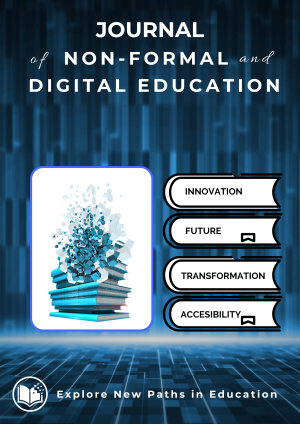Perspectives on outdoor education for preschoolers
DOI:
https://doi.org/10.63734/JNFDE.01.01.008Keywords:
Outdoor education, Early childhood, Experiential learning, Social-emotional development, Nature-based learningAbstract
The purpose of the article about outdoor education is to highlight the importance and benefits of learning in natural environments, especially for preschool children. It aims to show how outdoor education supports cognitive, emotional, social, and physical development, complements formal education, and promotes active, experiential learning. The article also explores how outdoor activities can meet children's basic psychological needs and contribute to their overall well-being and inclusion.
The methodology used in the article is primarily descriptive and practical. It presents a theoretical overview of outdoor education, The approach is experiential and learner-centred, focusing on: Learning through direct interaction with nature; Active participation in outdoor games, storytelling, creative activities, and environmental tasks; Integration of curriculum goals (language, math, communication) into natural settings; Use of observation and reflection to guide and adjust educational practices; Encouraging personal responsibility, teamwork, and inclusion.
The article on outdoor education highlights several key findings and expected outcomes. It shows that children are more active, engaged, and motivated when learning in outdoor environments, which fosters deeper involvement in the educational process. Such experiences also strengthen their connection to nature, encouraging respect for the environment and increasing awareness of ecological issues. Outdoor education proves particularly beneficial for diverse learners, including those with learning difficulties, by providing alternative, hands-on opportunities to explore and understand concepts. Moreover, combining physical activity with learning has a positive impact on well-being, helping to reduce stress while supporting emotional and mental health. Finally, outdoor learning facilitates curriculum integration by linking core subjects with real-life, experiential contexts, promoting a multidisciplinary approach to education.
This research highlights the importance of outdoor education as a powerful tool for enhancing early childhood development. The findings suggest that integrating outdoor education into early learning curricula can improve engagement, inclusiveness, and overall well-being, offering educators a meaningful way to enrich traditional teaching methods.
References
Larimore, R. A. (2020). Preschool beyond walls: Blending early childhood education and nature-based learning.
Born, P., & Selly, P. (2017). Teaching STEM outdoors: Activities for young children. Redleaf Press.
Lifelong Learning Programme (2010–2012). Manual de educație outdoor.
Published
Issue
Section
License
Copyright (c) 2025 Journal of Non-Formal and Digital Education

This work is licensed under a Creative Commons Attribution 4.0 International License.















